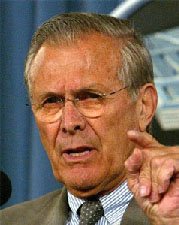Now what is the message there? The message is that there are no 'knowns.' There are things we know that we know. There are known unknowns. That is to say there are things that we now know we don't know. But there are also unknown unknowns. There are things we don't know we don't know. So when we do the best we can and we pull all this information together, and we then say well that's basically what we see as the situation, that is really only the known knowns and the known unknowns. And each year, we discover a few more of those unknown unknowns.Rumsfeld, a political survivor of the Watergate era whose main goal was to exorcise the ghost of Vietnam forever—restoring American power and prestige in the world—was outraged in the fall of 2002 at the very suggestion of a resemblance with Iraq.
Vietnam? You think you have to tell me about Vietnam? Of course it won't be Vietnam. We are going to go in, overthrow Saddam, get out. That's it.Rumsfeld: January 15, 2003
The fact that the inspectors have not yet come up with new evidence of Iraq's WMD program could be evidence, in and of itself, of Iraq's noncooperation. We do know that Iraq has designed its programs in a way that they can proceed in an environment of inspections and that they are skilled at denial and deception.A month before the unprovoked invasion of Iraq, (February 20, 2003) Rumsfeld was asked by PBS's Jim Lehrer:
Do you expect the invasion, if it comes, to be welcomed by the majority of the civilian population of Iraq?And Rumsfeld responded:
There is no question but that they would be welcomed. Go back to Afghanistan--the people were in the streets playing music, cheering, flying kites, and doing all the things that the Taliban and the Al Qaeda would not let them do.10 days after the launch of the invasion, Secretary Rumsfeld was interviewed on ABC "This Week with George Stephanopoulos", (March 30, 2003):
Mr. Stephanopoulos:
Finally, weapons of mass destruction. Key goal of the military campaign is finding those weapons of mass destruction. None have been found yet. . . . None was found. How big of a problem is that? And is it curious to you that given how much control U.S. and coalition forces now have in the country, they haven't found any weapons of mass destruction?
 Sec. Rumsfeld:
Sec. Rumsfeld: Not at all. If you think . . . the area in the south and the west and the north that coalition forces control is substantial. It happens not to be the area where weapons of mass destruction were dispersed. We know where they are. They're in the area around Tikrit and Baghdad and east, west, south and north somewhat. . . .Mr. Stephanopoulos:
Do you think we'll still be fighting in Iraq six months from now?Sec. Rumsfeld:
Oh, goodness, you know, I've never -- we've never had a timetable. We've always said it could be days, weeks, or months and we don't know. And I don't think you need a timetable. What you really need to know is it's going to end and it's going to end with the Iraqi people liberated and that regime will be gone.June 24, 2003:
I don't know anybody that I can think of who has contended that the Iraqis had nuclear weapons.Responding to a U.S. soldier serving in Iraq who asked him why troops had to dig through scrap metal to armor vehicles, Dec. 8, 2004 (PBS):
As you know, you go to war with the army you have, not the army you might want or wish to have at a later time.

No comments:
Post a Comment